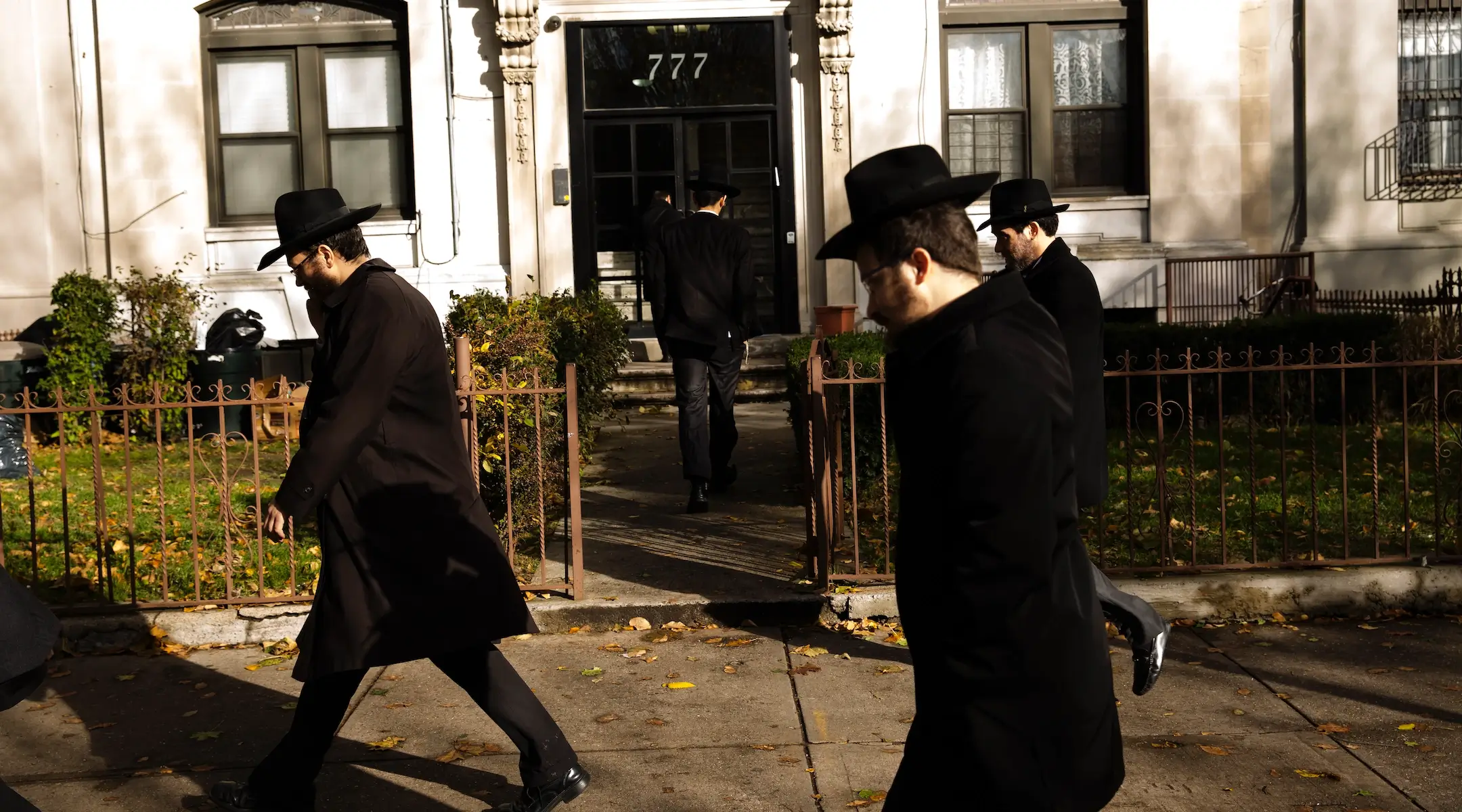Crown Heights get-out-the-vote activists aim to turn election into a show of Chabad’s local force
“Anti-semitism is on the ballot. October 7th is on the ballot,” read postcards that encourage Orthodox Jews to vote

Men walking in Crown Heights, Brooklyn, in 2017. Photo by Amir Levy/Getty Images
(New York Jewish Week) — Rabbi Menachem Mendel Schneerson, the late leader of the Chabad-Lubavitch movement, encouraged his followers to vote.
But three decades after his death, too few Jews living in Crown Heights, the movement’s home base, are casting ballots, according to a nonprofit there aimed at increasing voter turnout.
There is no question about which presidential candidate will win New York City, but the Jewish Future Alliance is encouraging Crown Heights Jews to vote anyway — to signal to local elected officials that they make up a constituency worth paying attention to.
“Anti-semitism is on the ballot. October 7th is on the ballot,” read postcards that the group mailed recently as part of a get-out-the-vote campaign. “Elected officials are looking to see if the community turned out.”
The group’s director, Rabbi Yaacov Behrman, believes that after decades of attrition, a change is afoot in the neighborhood, with community members increasingly turning out to vote.
“There was a perception out there that our vote doesn’t matter,” Behrman said. “With everything going on in the world, even before Oct. 7, we started to see how elected officials actually impact our lives.”
Behrman’s group collated data about voter turnout by cross-referencing publicly available voting records with community sources such as school lists and phone books. The data showed that, between the 2013 mayoral primary and the 2021 mayoral primary, Jewish community turnout in the 43rd district, which covers Crown Heights and Prospect Lefferts Gardens, rose more than 400%, from 479 to 2,696, including newly registered voters. (For already registered voters, turnout increased by around 200% over that period, the group says.) The data shows that 5,602 Jewish community members in the district have voted since 2020, and the group estimated that there are more than 5,000 unregistered Jewish voters in Crown Heights.
Nationwide, around 70% of American Jews identify with the Democratic Party. Among Orthodox voters, however, three quarters are Republicans, according to a Pew Research Center survey. Crown Heights supported Trump by a considerable margin in the 2020 presidential election, forming an island of red in deep blue Brooklyn, and Trump and some of his surrogates have courted Hasidic voters ahead of Tuesday’s vote.
Some of the top issues for the Crown Heights community are crime and funding for social programs, said Zalman Friedman, a member of the Crown Heights Jewish Community Council, a nonprofit that provides community services in Crown Heights. Its board members are periodically elected by the community. According to Friedman, one goal of voters in the neighborhood is elect candidates who will advance school vouchers and other strategies to make yeshiva education more affordable.
“Participate in the conversation, participate in the process, and that’s half the battle,” Friedman said. “The candidates should know that you’re listening, that you’re involved.”
The six members of the Jewish council were voted in earlier this year for three-year terms — meaning that this is their first presidential election on the job. Members of the council have leaned into getting the vote out, sending out a letter to the community, putting ads online and in messaging groups, and setting up booths in the neighborhood, Friedman said.
Both the Crown Heights Jewish Community Council and the Jewish Future Alliance are nonprofits and cannot endorse any candidates. While New York’s electoral college vote will almost certainly go to Democrat Kamala Harris, voters aim to have an impact in local elections, such as next year’s mayoral race.
“When elected officials draft policy, they look at community turnout,” Behrman said. “So if you vote, the elected officials are going to see that and it’s going to make people understand that we care.
“In the June primary, when people are running for mayor, if they see a large turnout of the community, they themselves are going to take into consideration the needs of the community,” he said. “Just going out to vote, no matter who you vote for, helps the community.”
The Crown Heights Jewish community used to turn out for elections at a high rate in the 1950s and 1960s, Behrman said, but turnout declined because people felt that their votes did not have an impact.
“Everybody voted in this community. There was no such thing as not voting,” he said. “We want to bring that back.”
That perception of local votes “not counting” has been changing as community residents understand that local elections have an impact on issues important to Crown Heights residents, such as education and social services funding. New York’s Hasidic schools, or yeshivas, came under heavy scrutiny in recent years, starting with a New York Times series of exposes in 2022 that brought the schools national attention. The articles said the schools neglected secular education to the detriment of students, while community members argue the system is a successful, and essential, pillar of the community.
The Oct. 7, 2023 Hamas attacki and the subsequent surge in antisemitism furthered voters’ interest in electing supportive local politicians, Behrman said. There have been hate crimes against Hasidic Jews in Brooklyn and anti-Israel protests have disrupted life in the area, causing traffic disruptions, holdups at JFK Airport, and making people feel unsafe on the subway, he said.
“People are spit at, people are verbally assaulted and physically assaulted and a lot of that has to do with the rhetoric of elected officials,” Behrman said. “People want to do something and they want to help and they want to fight back and voting is a way of fighting back.”
The Jewish Future Alliance’s postcards were sent out to thousands in the neighborhood to encourage them to vote. After the election, community members who voted will receive a thank-you card, and those who didn’t will get a card saying something along the lines of, “We missed you,” Behrman said.
“We want people to understand that it’s appreciated and it’s needed,” he said.
In addition to the video advertisements and postcards, the get-out-the-vote campaign released a series of five testimonials to local media from longtime neighborhood voters urging residents to participate.
In one of the testimonials, Crown Heights resident Shabsi Turner describes how he has voted in every election since 1952, except for one election that occurred while he was serving in the military.
“Growing up, everybody I knew voted,” Turner said in a testimonial published on the community news site ColLive. “Most of them were Europeans of the previous generation, and they felt more intensely about voting than we Americans. Unfortunately, some of us take it for granted.”
“Your vote matters because elections have been won by a single vote,” Turner said. “That vote could be yours.”
A message from our Publisher & CEO Rachel Fishman Feddersen

I hope you appreciated this article. Before you go, I’d like to ask you to please support the Forward’s award-winning, nonprofit journalism so that we can be prepared for whatever news 2025 brings.
At a time when other newsrooms are closing or cutting back, the Forward has removed its paywall and invested additional resources to report on the ground from Israel and around the U.S. on the impact of the war, rising antisemitism and polarized discourse.
Readers like you make it all possible. Support our work by becoming a Forward Member and connect with our journalism and your community.
— Rachel Fishman Feddersen, Publisher and CEO


























